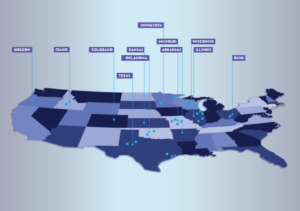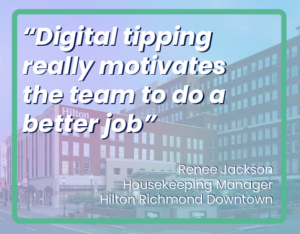How Staff Turnover Affects Hotel Guest Satisfaction
Among the many challenges that high turnover creates for hotel GMs, the impact to guest satisfaction scores can be the least predictable, yet the most important to control.
While financial costs of turnover are well-documented, its effect on the guest experience is more nuanced. High turnover can have a ripple effect that influences your hotel’s reputation, repeat bookings, overall profitability, and the retention of other employees.
Problem 1: Your Service Quality Never Reaches Its Full Potential
Always training, never mastering
High turnover creates an environment of perpetual training. When team makeup changes frequently, your focus shifts to onboarding and basic skill-building, often at the expense of developing the finer points of exceptional service.
Employees who are just getting started at your hotel will inevitably make mistakes, and they usually need about a month to reach proficiency with all the demands of their work. Those who leave before mastering the details leave even bigger gaps in the guest experience.
Depending on the cadence of hires and separations at your hotel, your team may only get a couple of months at a time where the focus is on increasing service excellence rather than training. The less tenure your whole team has, the more likely your returning guests will wonder why consistency is lacking.
Long-term employees bear the brunt
In addition to the immediate impact of gaps in service quality, it’s important to remember the wellbeing of your long-term employees. The employees who stick with you often experience frustration and burnout as they watch their teams cycle through newcomers.
The emotional toll of repeated goodbyes can diminish their job satisfaction and, in turn, their enthusiasm for delivering great service. Since these seasoned team members are often guest-facing, their disengagement can directly influence guest perceptions.
Problem 2: Your Team Culture Isn’t Centered on Guest Satisfaction
Teams in flux focus on survival, not growth
When turnover destabilizes teams, the group’s energy shifts to plugging gaps in service rather than improving it. Teams forced into “fix-it” mode struggle to find time to align on shared goals, including guest satisfaction.
Higher retention allows teams to develop camaraderie and a shared sense of purpose. Teams that stay together longer can reflect on their performance, set goals for improving guest satisfaction scores, and measure their progress over time.

In fact, studies show that employees who are more engaged with their work and its impact are also more likely to stay in that role. And even better for hotel managers, employee engagement also translates to increases in customer loyalty, employee productivity and profitability for the whole business.
Turnover stifles internal leadership
Stable teams provide fertile ground for leadership to emerge. Employees with natural leadership skills can rally their teams around a vision of excellent service, motivating others and driving improvements.
However, in high-turnover environments, these potential leaders are often the ones tasked with onboarding and training new hires. It’s natural to tap your most experienced employees as trainers, but doing so too often can leave them no bandwidth to influence team culture and set a continuing example on service quality. Improving retention frees up these internal leaders to make a greater impact on your guest satisfaction.
Problem 3: Guests Don’t Know Your Team is Working Hard for Them
Turnover diminishes guest perceptions
When your team is perpetually stretched thin, guests sense the difference. They may encounter slower service, inconsistent interactions, or unpolished experiences that fail to inspire positive reviews.
This, in turn, impacts your ability to attract future guests and diminishes opportunities for tipping—a key motivator for many hospitality workers.
Hotels with higher staff retention enjoy a more polished and cohesive guest experience. Guests feel this difference when greeted by a well-practiced front desk team, assisted by attentive bellhops, and served by housekeeping staff who never miss a detail.

The longer employees stay with you, the more they understand the brand and property standards they need to meet. They’ll also be experienced in dealing with any quirks of the location or the typical clientele, which empowers them to anticipate guest needs and deliver memorable stays.
Recognition in any form motivates teams
Creating systems that make it easy for guests to leave gratuities—whether digitally or traditionally—motivates staff to consistently hit the marks of great service. This combines the intrinsic reward of recognition with the extrinsic reward of monetary gain. Together, these incentives encourage employees to prioritize guest satisfaction and work collaboratively to deliver excellence.
Retention strategies that can help you increase guest satisfaction
Reducing staff turnover in your hotel isn’t just a win for your HR metrics, it’s a direct investment in guest satisfaction. Here are a few strategies to consider:
Develop a repeatable, shared onboarding process:
- A structured onboarding program can help new hires feel confident and committed from day one.
- Spreading the workload of shadowing, training and coaching around not only to tenured employees, but also to newer employees or members of management can help reduce the negative impact of turnover on the existing team.
- Tangible goals and measurable milestones for training help you and your employees know when teammates are ready to switch from “newbie” to “one of the crew.”
Prioritize employee engagement with guest satisfaction goals:
- Regular feedback sessions, recognition programs, and growth opportunities give teams a sense of ownership around their goals, and can boost morale and reduce attrition.
- Engaged employees are more likely to be more productive, which in turn creates more opportunities for recognition. Don’t miss the chance to celebrate small wins.
- More engaged employees can also influence customer loyalty. Encourage your team to engage with guests, and measure loyalty or repeat customers as a possible mark of success for your teams.
Invest in employee morale:
- Encourage team-building activities and leadership training to create a sense of unity and shared purpose.
- Consider ways to increase guest feedback for teams, like leaving survey cards in rooms, asking for online reviews, or providing space for feedback on mobile/online checkouts.
- Use cashless tipping programs as a tool for increased recognition and monetary rewards for a job well done.
High staff turnover poses unique challenges for hotels, especially in delivering a consistent guest experience. But dedicated efforts to reducing turnover can really pay off.
By addressing turnover’s root causes and prioritizing retention, you can create a stable, motivated team capable of delighting guests and driving positive reviews. In the end, the path to guest satisfaction often begins with the satisfaction of your employees.






